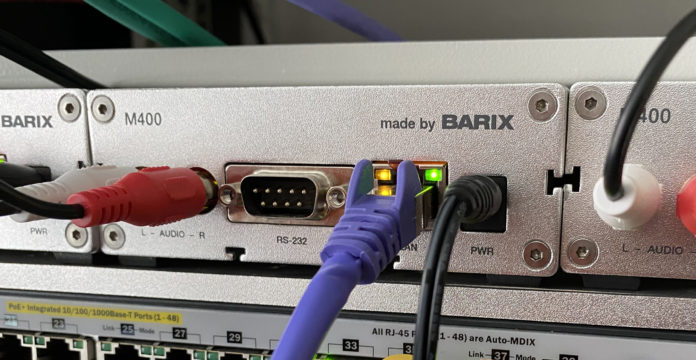With the decision on Sept. 15 by the National Association of Broadcasters to cancel the 2021 NAB Show, RBR+TVBR welcomes vendors who planned on hosting exhibit booths to share their product announcements with us for publication in RBR.com and our Weekly Tech Roundup.
Exstreamer audio over IP codecs from Barix are widely considering for radio broadcasters’ technical infrastructures, with its applications ranging from studio-to-transmitter (STL) and studio-to-studio (SSL) links to remote contribution from the field.
Now, Barix has launched the Exstreamer M400 IP audio decoder, the first model in a new generation of Exstreamer solutions.
“Radio broadcasters large and small have long depended on the robust reliability, outstanding audio quality, and rich feature set of our previous Exstreamer products for their critical audio transport requirements,” said Davide Nossa, Product Manager at Barix. “The Exstreamer M400 delivers these benefits on a next-generation hardware platform with more processing power, enhanced security features, and greater extensibility, alongside expanded support for audio formats and technology standards including Opus and AES67.”
The Exstreamer M400 features stereo, line-level, analog audio output with RCA-type connections and can decode streams in MP3, AAC-HE, FLAC, PCM, Opus, and Ogg Vorbis formats. Newly added AES67 support enables the Exstreamer M400 to instead be configured as a dedicated AES67 receiver and decoder, enabling seamless integration into AES67-based audio-over-IP networks plus interoperability with Dante-compatible devices. The Exstreamer M400 incorporates the full AES67 interoperability guidelines including RTP audio delivery, multicast addressing, and PTP-based synchronization with a separate master clock device. Supported discovery methods include SAP (Session Announcement Protocol), mDNS (multicast DNS), and RTSP, enabling the decoder to automatically identify and list available streams from Dante, Ravenna, and other audio over IP solutions that use these protocols. SDP (Session Description Protocol) information can also be manually inserted for interoperability with third-party solutions that do not support these standards.
Powered by Barix’s high-performance, Linux-based IPAM 400 audio module, the Exstreamer M400 features significantly higher processing power than earlier Exstreamer models and a more programmable, software-driven architecture that enables easier expansion, rapid prototyping, and greater customization. A larger buffer size and advanced buffer management technology can be configured to further bolster the Exstreamer M400’s resilience to network performance disruptions in applications where minimizing latency is not critical.
Expanded support for IT security standards includes HTTPS: support for audio streams and the web-based management interface, plus secure, encrypted SIP communication links using TLS and SRTP. Other new features relative to earlier Exstreamer models include IPV6 support and internal audio file storage with externally triggered playback.
The Exstreamer M400’s Linux-based architecture enables extensive upgradability, supporting Barix’s mission of continually enhancing its products while enabling Barix engineers to quickly customize functionality to meet specific customer project requirements. A modern API is planned for future release for developers, replacing previous Exstreamer models’ older CGI control specification as part of Barix’s commitment to support the latest technology standards.
The Exstreamer M400 with AES67 support is now shipping.


 Distributed Tuesdays at 8am Pacific via email by RBR+TVBR.
Distributed Tuesdays at 8am Pacific via email by RBR+TVBR.

